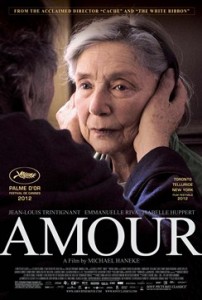
Director: Michael Haneke
MPAA Rating: PG-13
Michael Haneke’s most recent achievement is a wondrous film entitled Amour, i.e., “Love.” It is with love that I watched the film and with love that I write about it now. For Amour, the acclaimed Austrian director picked up his second Palme d’Or at the 2012 Cannes Film Festival and the Best Foreign Language film award from the New York Film Critics Circle this week. The film is Austria’s official selection to the Academy of Motion Picture Arts and Sciences, and I believe it has a strong chance of receiving the Oscar as 2012’s Best Foreign Film. While Haneke has delivered what I consider masterpieces before –Caché (2005) and The White Ribbon (2009) – there were others who found these and earlier works to be too cold and harsh to be rewarded with the masterpiece mantle. If unpersuaded before, critics and audiences alike should have no trouble pinning the masterpiece title to Haneke’s latest – a marvelous representation of love in a realistic, profound, and deeply moving film.
Amour tells the story of Georges and Anne Laurent (Jean-Louis Trintignant and Emmanuelle Riva) – a Parisian married couple now in their 80s who were once musician teachers. Early in the film, Anne suffers a stroke which paralyzes the right side of her body. She returns home from the hospital and we see how she and Georges cope with the new situation. She still has her speech and can do some things for herself, but she obviously leans on Georges for support as she struggles to lead as normal a life as possible. Sadly, Anne suffers a second stroke that leaves her almost entirely incapacitated. From this point on, the film becomes more difficult to watch because we have cared about and identified with Georges and Anne from the beginning. Now, we see how true love withstands the day-to-day test of an ongoing, serious medical crisis.
Rarely has a film so unceremoniously and unflinchingly portrayed the relationship between a caretaker and the cared for. To Haneke’s great credit, as well as to Trintignant and Riva in the leading roles, there is no sentimentality or melodrama here. Georges and Anne are never presented as perfect people or as paragons of virtue and strength. They are flawed and extremely relatable human beings who have suffered a loss and who are dealing with it the best way they know how. After Anne’s first stroke and visit to the hospital, she makes Georges promise that he will not take her back there. Implicit is an understanding the Georges will also not institutionalize her in a nursing home or similar facility but that he will care for him herself, albeit with help from in-home nurses. When Anne deteriorates, it becomes much harder for Georges to deal with the situation and his daughter (Isabelle Huppert) adds her two cents by suggesting her mother needs care beyond what can be provided in her parents’ apartment.
I have intentionally avoided taking the reader through certain plot points or mentioning key scenes because these should (a) be experienced for the first time while watching the film and/or (b) they amount to spoilers which I do not include in my reviews. The first ten minutes are astonishing and may leave you, as they did me, in a sort of daze. I think the opening is something film enthusiasts will want to debate, as is some of the symbolism throughout, and the film’s startling, remarkable, and unique ending.
With what critics are calling a “softer” film by Haneke standards, the director has certainly covered different territory in Amour but he is still fearless, single-minded, and perfectionistic in his approach. Additional credit goes to Trintignant and Riva who deliver pitch-perfect performances as the portrayers of “love.” The trio delivers an excellent film about the breadth and depth of love without overwrought sentiment or manipulative misdirection. Amour is easily one of the best films of 2012. It is a brilliant work of art that deals with love in both spoken and unspoken forms as well as the lengths to which love compels us to go. It is a masterful exploration of love approaching death’s door; it is not to be missed.






